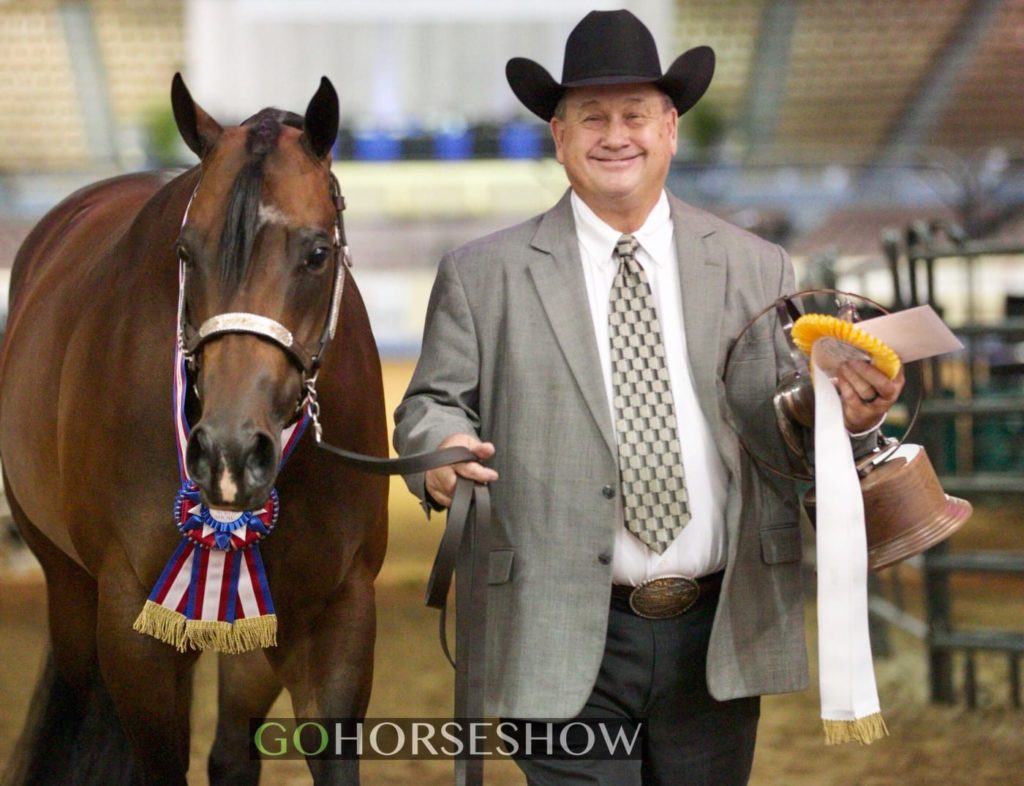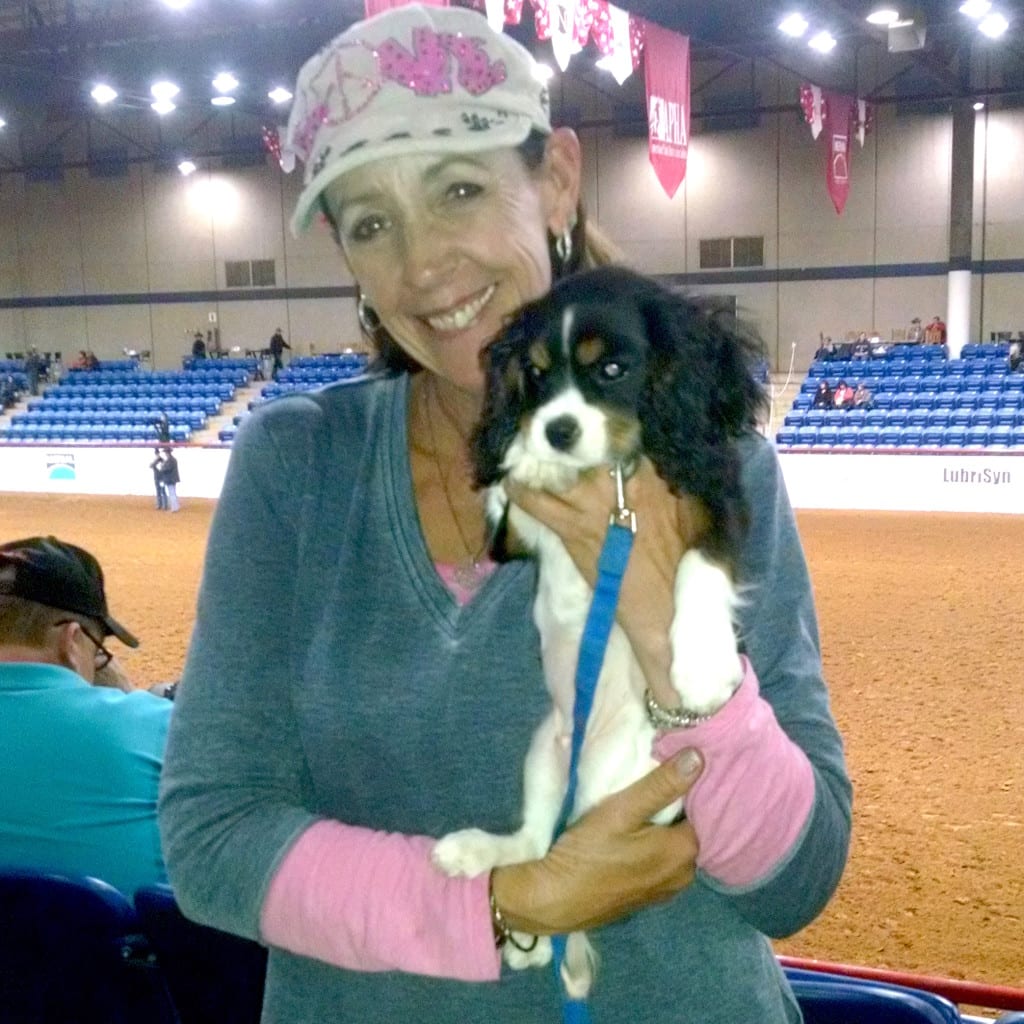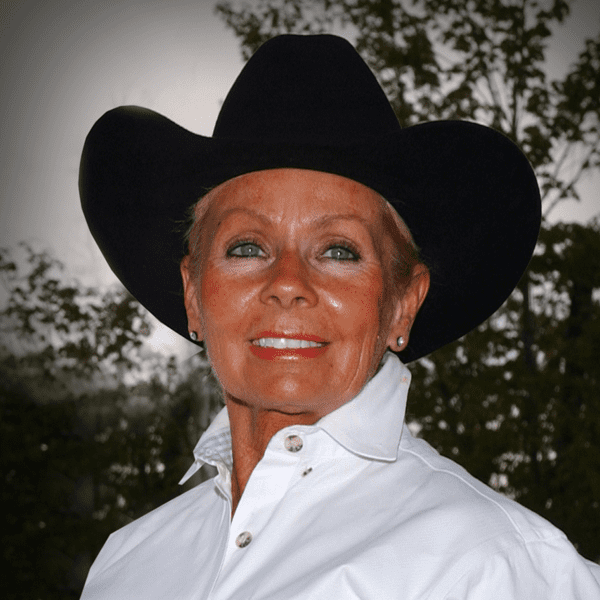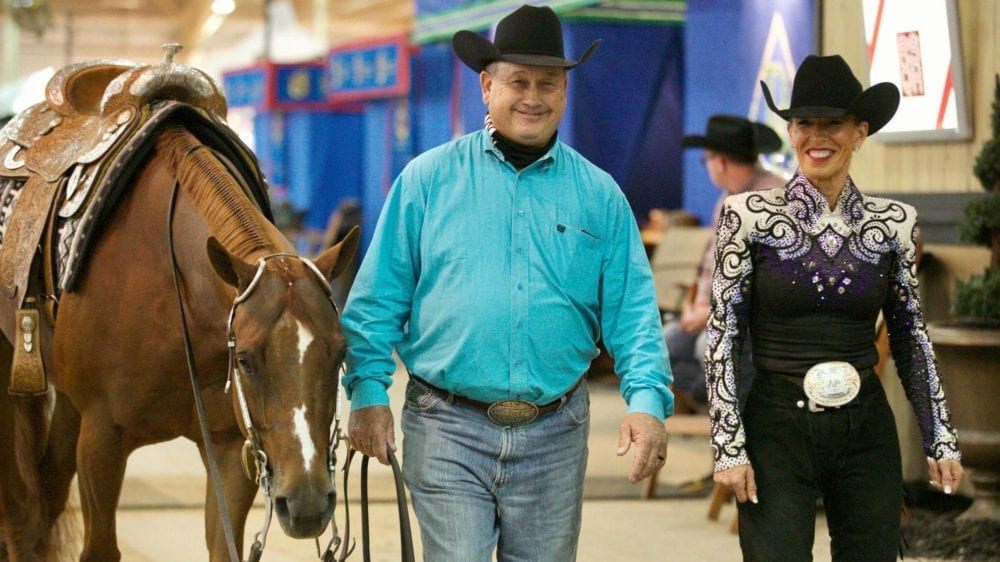We’ve already examined what top amateurs sacrifice to be successful, but what do successful trainers sacrifice to find and maintain success in the show pen?
We spoke to established all-around trainers Sandy Jirkovsky (J Bar S Training), Dan and Darlene Trein (Trein Training Center), Karen Qualls (Premier Performance Horses), and Bruce Walquist (Walquist Quarter Horses) to get their take on what a successful trainer must be willing to sacrifice to find long-term success in the industry.
Again, we found many common themes in what top trainers have had to sacrifice for success. We have broken them down into the following six categories: Self-Care, Ego, Family Time, Caving to Client Pressure, Difficult Clients, and the Need for Approval.
Self-Care
Trainers often report sacrificing self-care so that the horses in their charge can live their best lives instead. Training horses is a physical job and, to keep the horses in top-show shape, trainers must ensure the horses are well-cared for. 
Jirkovsky often teases that her horses get better food and better medical care than she allows for herself. She says that, specifically during shows, trainers often go without regular meals and operate on little sleep (sometimes only a couple of hours) to keep up with their clients and horses.
Self-sacrifice is “part of the job,” says Sandy. “But you do it because you love it and the horses.” Although, she admits that she would advise young trainers not to forget self-care. Indeed, a trainer has to take care of themselves to be at their best.
Qualls agrees with Jirkovsky, saying, “There are still nights I sleep in the barn with a sick horse. It just comes with the job.” But, she admits, “The level of responsibility is intense, but we make it happen. I do this because I love it.”
Karen reminds young trainers to do what they need to do at shows to prepare their horses and clients but still take time to rest and eat. She says she will eat out with her team only once or twice during a show, but she makes time to eat alone the rest of the show. She finds the quiet time allows her to decompress and get more sleep to be her best self for her clients the following day.
Ego
Trainers are people too, and similar to amateurs, it can be easy to develop an ego once one has found success. However, allowing one’s ego to take over will make it difficult to maintain success over time.
 Specifically, the industry and techniques are constantly evolving, and there is always room for improvement. And, from a customer service perspective, clients often don’t remain with a trainer who is a primadonna.
Specifically, the industry and techniques are constantly evolving, and there is always room for improvement. And, from a customer service perspective, clients often don’t remain with a trainer who is a primadonna.
The Treins have a saying that, “The young centurions will run right over you if you’re not watching.” So essentially, the day you aren’t ready to make the best horse even better, you will be beaten by someone hungrier for success than you are.
Dan says, “We expect a good result, but we also can never expect a win because you’re dealing with animals, and they aren’t machines.” He has found great success in his career but reminds himself, “What have you done lately?” Dan believes the foundation of success in his and Darlene’s program is that they always put in the time and effort to improve.
 Walquist believes, “[Trainers] have to be willing to adjust and adapt our training methods to fit the circumstances and the time. For example, I no longer train horses today the way I did in the 1980s. So you have to be willing to learn new methods and styles of showing if you want to remain relevant. And sometimes, learning what not to do is just as important as learning what to do.”
Walquist believes, “[Trainers] have to be willing to adjust and adapt our training methods to fit the circumstances and the time. For example, I no longer train horses today the way I did in the 1980s. So you have to be willing to learn new methods and styles of showing if you want to remain relevant. And sometimes, learning what not to do is just as important as learning what to do.”
Jirkovsky says she regularly brings in other trainers for another eye or opinion to improve herself and keep a fresh perspective. However, she also has concerns that a trainer’s ego can get in the way of what is suitable for the horse.
Sandy asks, “Are you doing what’s best for the horse, or are you doing what’s best to win? Because sometimes those two things are mutually exclusive.” Most trainers get into the horse industry because they love the horse, and Jirkovsky reminds them not to forget why they started and not let their egos take the place of doing right by the animal.
Family Time
 Again, like the amateurs, time is a significant sacrifice that trainers make, but often it is on a much grander scale. Specifically, many trainers report that training horses is far more than a full-time job and it usually requires working as a trainer to the horse and a therapist and teacher to the client.
Again, like the amateurs, time is a significant sacrifice that trainers make, but often it is on a much grander scale. Specifically, many trainers report that training horses is far more than a full-time job and it usually requires working as a trainer to the horse and a therapist and teacher to the client.
Horses have round-the-clock needs, and clients do too. While many assume the role of “trainer” allows for a more flexible schedule, which is generally true in the off-season, it tends to be the exact opposite during show season.
Many trainers are on the road for weeks and even months at a time. New and experienced trainers alike feel pressure to spend all their time working with horses and clients, and there are not enough hours in the day to devote to other relationships. While these trainers are present for client milestones, they often sacrifice being present for their family milestones.
 Qualls admits, “I’ve missed my mom’s birthday for 35 years because there was always a huge show during her birthday weekend.” She says that training and showing horses is how she makes a living and her family understands that. However, she reminds young trainers that, while certain sacrifices are necessary, it is still essential to spend time with important people in your life.
Qualls admits, “I’ve missed my mom’s birthday for 35 years because there was always a huge show during her birthday weekend.” She says that training and showing horses is how she makes a living and her family understands that. However, she reminds young trainers that, while certain sacrifices are necessary, it is still essential to spend time with important people in your life.
Jirkovsky believes that the horses and clients are essential and require a serious time commitment. However, she wishes she could return to her younger trainer self and remind herself that family is still the most critical piece of the life puzzle.
She would advise young trainers, when sacrificing time with family in favor of clients and the horses, ask themselves, “Is this a worthy sacrifice? You aren’t a superhero. Remember that if you take care of family first, everything else will take care of itself.” She recommends young trainers “redefine success” by emphasizing the importance of participating in important family memories.
Caving to Client Pressure
There is a tremendous amount of pressure on trainers to prepare horses within a specific timeframe and for clients to have a certain level of success in the show pen – two things that can be somewhat beyond the trainer’s control.
Qualls cautions, “A horse is not a car, and they progress at their levels, and you don’t want to ruin the horse for the owner’s goals. Every horse is unique, and I am never going to sacrifice the longevity of a horse’s career to satisfy the owner’s demands.”
 The Treins agree, “New trainers need to accept the fact that the interests of the clients are a priority, but as the trainer, you are the expert, and it is your job to express the interests of the horse and whether they are even capable of meeting the owner’s expectations,” says Trein.
The Treins agree, “New trainers need to accept the fact that the interests of the clients are a priority, but as the trainer, you are the expert, and it is your job to express the interests of the horse and whether they are even capable of meeting the owner’s expectations,” says Trein.
Working with the client to help them set reasonable expectations for themselves and their mounts will help set them up for better success in the show pen. While it may seem daunting when you are just starting, and you need to keep your client happy to pay the bills, experienced trainers caution that you won’t retain happy clients long-term if you let them drive the bus too much. The key is to make the relationship with the client a partnership where the trainer expresses what is attainable so the client can find success on their level, and in their own time.
Difficult Clients
 Nearly all successful trainers we spoke to reported the need to say goodbye to difficult clients – whether that be a client that doesn’t pay their bills, one who creates barn drama, or one who refuses to give proper respect to your role as their trainer. This can be a struggle for new trainers in need of money or trying to make a name for themselves, but the veterans report they benefitted greatly in the long-term by letting go of difficult clients.
Nearly all successful trainers we spoke to reported the need to say goodbye to difficult clients – whether that be a client that doesn’t pay their bills, one who creates barn drama, or one who refuses to give proper respect to your role as their trainer. This can be a struggle for new trainers in need of money or trying to make a name for themselves, but the veterans report they benefitted greatly in the long-term by letting go of difficult clients.
Walquist says, “You’re going to have struggles with clients because, just like horses, they are all unique personalities. Difficult clients can be like a cancer for your business, and it can be best to cut it out to keep the best morale. If you were just training the horse, it’d be a lot easier.”
According to Qualls, problematic clients, or those who don’t fit into her program, tend to weed themselves out independently. She said her lesson was to be ok when these people walk away because it was better for the environment she was trying to foster anyway.
The Need for Approval
Many trainers reported their job as being thankless at times. Indeed, while nearly all felt that their clients were grateful after wins, handling the losses is always tricky, no matter how experienced you are as a trainer.
 Darlene Trein says that horses are animals, and even the best, most reliable ones have bad days. She says an open line of communication with her clients is vital, and when the horse has a bad day, she feels that disappointment as much as the client. The Treins believe the best way to keep client approval is to manage their expectations by communicating honestly with the client about what is reasonable to expect from a horse.
Darlene Trein says that horses are animals, and even the best, most reliable ones have bad days. She says an open line of communication with her clients is vital, and when the horse has a bad day, she feels that disappointment as much as the client. The Treins believe the best way to keep client approval is to manage their expectations by communicating honestly with the client about what is reasonable to expect from a horse.
Dan says, “As a trainer, you have to guide the owner into a level of competition that is appropriate for the animal and rider.” This includes directing the client where to put the horse to set them up for success. You cannot expect approval when you set your client up for failure.
Walquist agrees that setting the proper expectations for each client is critical to the management of their expectations. He says, “We try to develop a plan for each client – if you take a beginner to a big show, they will likely be disappointed with the results. You need to set your client and their horse up for success by setting attainable goals.”
Jirkovsky reminds trainers, “Our worth doesn’t come from what the judge thinks of us, but from seeing a horse and rider improve under your tutelage. That is the true win.” Of course, not every client will acknowledge their improvement, but this is where learning to take pride in your work as a trainer, without relying on gratification from others, is essential to avoid getting burned out.
***
 So, for the trainers reading this, remember, like all professionals, the happiest people are the ones who best balance the demands of the job with self-care and family time. Remember to find your worth in the little successes within your control and not the opinions of others.
So, for the trainers reading this, remember, like all professionals, the happiest people are the ones who best balance the demands of the job with self-care and family time. Remember to find your worth in the little successes within your control and not the opinions of others.
Remain honest with your clients about your abilities, their horses’ abilities, and what goals are reasonable and attainable. Keep appropriate boundaries with your clients, and if they do not respect those boundaries, be comfortable asking them to change or leave.
Finally, for the amateurs reading this, remember to thank your trainer – they’ve invested their time and efforts into seeing your dreams become a reality, often at a tremendous personal sacrifice. Stay honest with your trainer about your goals and financial commitment, and keep an open line of communication with them. Remember to respect their boundaries and be the type of client you would want to work with.
Click here for part 1 of this series, “Sacrifices Successful Exhibitors Make to Get to the Top…and Stay There: Part 1 – Amateurs.” And stay tuned to Part 3 of our sacrifice series featuring youth competitors.









